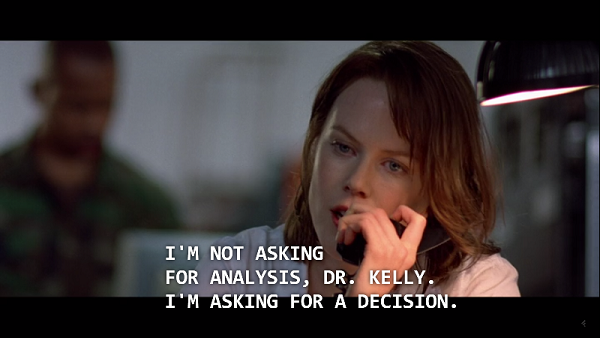Analysis, and the question of trust
[ by Charles Cameron — who was taught to think of “longer term” as extending to our children of the seventh generation ]
.
Here’s the problem:
**
In the Introduction to Cyber Analogies (Feb 2014, 133 pp., Emily Goldman & John Arquilla, eds) we read:
The project was conceived and carried out to help very senior, busy, responsible people understand topics and issues that are fast-moving and dynamic, and have potentially great consequences for society, security, and world affairs.
I’m never quite sure that “very senior, busy, responsible people” are the right people to task with understanding “topics and issues that are fast-moving and dynamic, and have potentially great consequences for society, security, and world affairs.”
Ahem.
Do I qualify as a heretic yet?
I feel some kinship here with Pundita‘s recent comment:
I venture there are too many Grand Master chess players in America’s defense/diplo establishment and not enough ping pong players.
And the estimated number of exposures varies, I know — but how far would you trust the “very senior, busy, responsible people” who, we now know [1, 2, 3], covered up our poison gas casualties in Iraq?
**
At the expense of strategic analysis..
I’m thinking about all this because there’s a shift under way in intel circles, as described in the recently issued Report of the Congressionally-directed 9/11 Review Commission, The FBI: Protecting the Homeland in the 21st Century:
Once deployed to the field, many of these analysts have been embedded in operational squads in the field, though their work favors support to tactical and case work at the expense of strategic analysis. The FBI launched a more structured Integrated Curriculum Initiative (ICI) in 2014, with the primary goal to develop a comprehensive basic training program for new agents and analysts that teaches them to operate in a threat-based, intelligence-driven, operationally-focused environment.
More explicitly, Scott Shane wrote in C.I.A. Officers and F.B.I. Agents, Meet Your New Partner: The Analyst:
Some people who study intelligence and counterterrorism are concerned that the pendulum could swing too far. Intelligence analysts, said Amy Zegart, a Stanford scholar who studies intelligence, could become too consumed by daily operations and neglect strategic thinking about threats that could be years away.
At the C.I.A., she said, counterterrorism analysts are already “too tactical,” focused on the next drone target. If the same model is now applied to the rest of the agency’s work, other analysts, too, could be caught up in short-term demands, she said. “Who in the U.S. government,” she asked, “is going to be thinking about longer-term threats?”
Longer-term? You mean, longer than the current electoral cycle?




March 29th, 2015 at 12:58 pm
There’s an anecdote I’ve related over at my place which I think is relevant to this post. Many years ago when I was working for a German company I was introduced to a company bigwig. His title was Director of Long Range Planning. I asked Herr Doktor how long “long range” was? His answer: about three weeks.
.
I think the problem is a little different than Pundita suggests. I think the problem is that there are two many checkers (draughts) players in the American defense/diplo establishment who think they are Grand Master chess players.
March 29th, 2015 at 2:14 pm
Thanks, Dave.
.
I always enjpoy these game comparisons, and appreciate your offering the translation “draughts” for “checkers”. But hey, “deck shuffleboard” maybe? — on turbulent seas?
March 29th, 2015 at 9:01 pm
How did those “very senior, busy, responsible people” achieve their lofty positions if they need what I assume are dumbed down explications of important, complicated and consequential topics before they make decisions about them? What qualifications got them to where they are now if they are so limited? And what exactly are they so darned busy doing right now that they will only have time to skim what somebody else has skimmed for them about important matters? We have what I believe is a probably fatal problem with the culture of our leader class that a new way of briefing isn’t going to fix.
.
And speaking of culture, the U.S. Army at the beginning of the last century in the Philippines didn’t need differentiated operators and an analysts trained to “operate in a threat-based, intelligence-driven, operationally-focused environment.” Men like Lt. Johnston and Capt. Pershing just looked, learned and got on with business while generals like McArthur listened to what they had to say and backed them. To me, that is a result of a lost culture that can’t be duplicated by tinkering with organizational structure.
.
How we get something of that culture back, short of a very bad defeat that will shake people up, I do not know.
March 30th, 2015 at 3:09 am
“And speaking of culture, the U.S. Army at the beginning of the last century in the Philippines didn’t need differentiated operators and an analysts trained to “operate in a threat-based, intelligence-driven, operationally-focused environment.””
You are delusional. They Observed (looked), they Oriented (learned) towards an advantage, and Decided (got on with business), while generals like McArthur thought about it and Acted.
I think McChrystal did likewise in Afghanistan, but got cut off when nobody thought about what he was actually trying to accomplish and acted on his thinking without him, and in a negative direction.
Culture eats structure, unless, of course, it doesn’t.